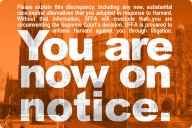You have /5 articles left.
Sign up for a free account or log in.
When a new administrator arrives at a college or university, disagreements not infrequently arise between the new person and the campus's existing staff. One dean or program director's favorite can become a pariah of his or her replacement, and vice versa. But a new administrator who wants to change the dynamics in a meaningful way had better make sure that he or she is on sound footing.
That is but one of the clear (and for one of the parties, expensive) lessons of a Pennsylvania appeals court's ruling this month in a case involving the University of Pennsylvania. The Superior Court of Pennsylvania upheld a 2007 decision in which a trial court judge and jury ordered Penn to pay $4 million to Mark L. Helpin, finding that the university had effectively fired the former dental professor and breached its employment contract with him.
As recounted by both courts, Helpin, upon his hiring by Penn's dental school as an assistant professor of pediatric dentistry in 1989, had helped the university turn around the flagging fortunes of a dental clinic at the Children's Hospital of Philadelphia that served special needs children, and his initial employment letter and subsequent annual compensation letters had tied his pay heavily to the success of that clinic. Throughout the 1990s and into the early part of this decade, Helpin was consistently earning 50 percent of the net surplus from the Children's Hospital clinic.
But when Penn replaced Raymond Fonseca, the dean who had hired and supported Helpin, in 2003 with Marjorie Jeffcoat, Helpin's situation changed dramatically. For reasons that are not made clear in the court record, Jeffcoat stripped Helpin of his chairmanship and shifted him from the Children's Hospital clinic that he had helped resuscitate to another Penn clinic in the Philadelphia suburb of Bryn Mawr.
His new compensation letter in 2004 was, like its predecessors, based on his billable hours, but because Helpin was now in the "Bryn Mawr boondocks" instead of the central Children's Hospital clinic, his compensation fell sharply, the court wrote. He resigned from Penn in September 2004, contending that "his resignation was forced due to (1) the intolerable conditions surrounding his reassignment ... and (2) the reduction of his overall compensation" because his pay was no longer linked to the original, highly successful dental clinic, the Superior Court wrote.
In 2007, a lower court jury backed Helpin's allegation that Penn had effectively fired him and breached a contract with him by radically altering his working arrangements. The university challenged the court's finding and its $4 million award to him (for lost compensation) on a series of grounds. (Helpin, too, actually appealed the lower court's ruling, arguing that he should have received interest on the award.)
In its opinion, the Superior Court soundly rejects the university's various arguments, most of which focus on whether the employment and compensation letters he received were equivalent to a contract (Penn argued that they were "aspirational" documents that were "far too ambiguous and imprecise" to be binding) and, even assuming there was a contract, that the damages awarded were excessive.
"In this case, the facts of record demonstrated that the [Children's Hospital] clinic prospered under Dr. Helpin's direction for 13 years and offered no indication that such prosperity would not have continued had Dr. Helpin been allowed to continue in his former capacity as the clinic's director," the appeals court wrote.
As if the upholding of the $4 million damage claim was not painful enough for Penn, the appeals court slammed the university and its lawyers for its conduct in the case. In the portion of its appellate brief where the university was supposed to recite the factual history of the case, Penn's statement "is rife with contention, its characterizations of the record sharply skewed. Such tendentious statements are wholly inappropriate," the appeals court wrote. "Penn’s counsel is admonished that the manner of preparation apparent in this portion of its brief is not to be repeated."
Penn officials declined to comment on the case. Helpin, who is now a dentistry professor at Temple University, Penn's Philadelphia neighbor, referred calls to a lawyer who could not be reached.









